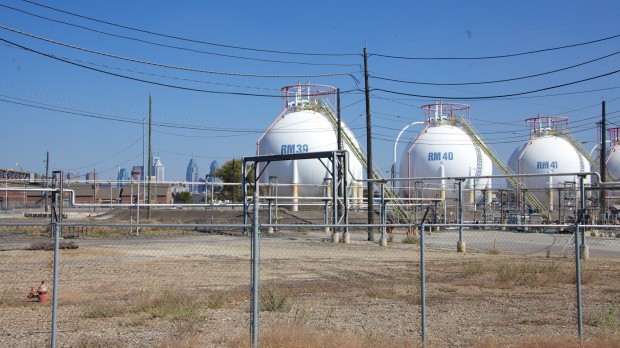
Philadelphia Energy Solutions is the largest oil refining complex on the Eastern seaboard. Half of all Bakken Crude traveling across the country by rail ends up at the PES plant.
Nat Hamilton/WHYY


Philadelphia Energy Solutions is the largest oil refining complex on the Eastern seaboard. Half of all Bakken Crude traveling across the country by rail ends up at the PES plant.
Nat Hamilton/WHYY

Nat Hamilton/WHYY
Philadelphia Energy Solutions is the largest oil refining complex on the Eastern seaboard. Half of all Bakken Crude traveling across the country by rail ends up at the PES plant.

Nat Hamilton/WHYY
Philadelphia Energy Solutions is the largest oil refining complex on the Eastern seaboard. On Monday, it filed for Chapter 11 bankruptcy to restructure its debt.
Philadelphia Energy Solutions, the largest refiner on the East Coast, says its operations will not be disrupted by its Chapter 11 bankruptcy proceedings aimed at restructuring its debt.
The crude oil refinery in South Philadelphia blames its financial problems on a George W. Bush-era renewable fuels program that increases the amount of biofuels, primarily ethanol, in gasoline. Merchant refiners, or those that do not have a retail division, say the Renewable Fuel Standards put them at a disadvantage. Instead of using ethanol in their products, refiners like PES must buy credits, known as RIN’s, which are traded by financial speculators and energy companies.
Philadelphia Energy Solutions, along with other area refiners, have urged the EPA to reform the program.
The Chapter 11 filing states the company doesn’t have adequate funds to buy credits for this year. PES CEO Greg Gatta said the plan to restructure its debt filed in U.S. Bankruptcy Court in Delaware “positions PES well for the future with a sustainable capital structure and additional liquidity.”
“In order to complete this process without delay, we will continue to work with the government to address the broken RFS system that is harming smaller independent merchant refiners like PES,” Gatta said in a statement. “This is a win for the region, the Commonwealth of Pennsylvania and the City of Philadelphia.”
But analysts say that’s not the only reason the company has struggled.
Owned by the private equity group Carlyle and Energy Transfer Partners, PES thrived while cheap shale oil from North Dakota had nowhere else to go. In 2012, the North Dakota oil was significantly less expensive than imports, which the Sunoco refinery had relied upon. Shale oil producers sent their crude to Philadelphia via oil trains, which at the time were the only way for North Dakota producers to unload their oil.
But over the past several years, pipelines connecting North Dakota’s shale oil to the Gulf Coast have come online. At the same time, global oil prices have dropped.
Sandy Fielden is director of research for commodities and energy at Morningstar, a research and investment advisory company. Fielden said these new pipelines, like the controversial Dakota Access line, helped make the oil trains unprofitable. That’s because the difference in price between imports and domestic shale oil narrowed from about $18 a barrel in 2012 to about $3 by the end of 2015. Add the cost of the rail shipment, and transporting oil via pipelines made more sense.
“What it did do was reduce the cost of shipping oil from North Dakota to the Gulf Coast market and therefore it banged another nail in the coffin of the crude-by-rail economics,” Fielden said. “If you’re a producer in North Dakota, now there was more than adequate pipeline capacity available. So given the choice between sending it down the pipeline to the Gulf Coast or putting it on rail, the more expensive rail cost meant you would ship it via pipeline.”
Fielden said the Renewable Fuel Standard requirements are not new, so the company would have known to factor in the costs.
“They’re trying to squeeze the government to say OK, well, ‘You guys are in trouble and we don’t want to lose all those jobs so we’ll give you a pass on your obligation to have to buy all these RIN certificates.”
Philadelphia Energy Solutions refines light sweet crude, not the heavy tar sands, into gasoline and heating oil. With less fuel coming from North Dakota, the refiner has had to fall back on imports from places like West Africa, which may be subject to more volatile pricing, said Christina Simeone, director of policy and external affairs at Penn’s Kleinman Center for Energy Policy.
Simeone says the costs of the Renewable Fuel Standards, also known as RFS, is a piece in the larger puzzle.
“While I believe the RFS is a part of the picture of why they’re economically poor performers, I don’t believe it’s the only factor and it may not be the major factor,” Simeone said.
Philadelphia Energy Solutions says restructuring its debt will help ensure a supply of gasoline for the region and have no impact on its employees or customers.
StateImpact Pennsylvania is a collaboration among WITF, WHYY, and the Allegheny Front. Reporters Reid Frazier, Rachel McDevitt and Susan Phillips cover the commonwealth’s energy economy. Read their reports on this site, and hear them on public radio stations across Pennsylvania.
(listed by story count)
StateImpact Pennsylvania is a collaboration among WITF, WHYY, and the Allegheny Front. Reporters Reid Frazier, Rachel McDevitt and Susan Phillips cover the commonwealth’s energy economy. Read their reports on this site, and hear them on public radio stations across Pennsylvania.
Climate Solutions, a collaboration of news organizations, educational institutions and a theater company, uses engagement, education and storytelling to help central Pennsylvanians toward climate change literacy, resilience and adaptation. Our work will amplify how people are finding solutions to the challenges presented by a warming world.